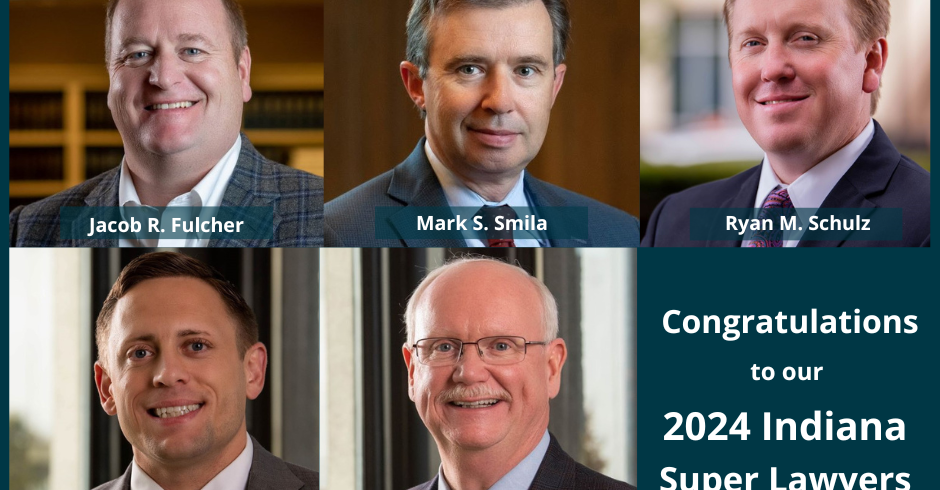Ever since the signing into law of the Indiana Medical Malpractice Act (MMA) by Governor Otis Bowen in 1975, physicians and other health care providers in Indiana have had no worries about potential exposure of their personal assets as the result of a judgment in favor of a patient in a medical malpractice lawsuit. This feeling of security may change if challenges to the MMA are successful.
Current MMA Protections
The MMA currently caps all damages recoverable in a medical malpractice lawsuit at $1.25 million per claim, of which the health care provider is responsible for the first $250,000 and the Indiana Patient’s Compensation Fund (PCF) is responsible for the remaining $1 million. To be entitled to protection of the MMA, the physician must carry the required level of insurance coverage (currently $250,000 per claim/$750,000 annual aggregate) and must pay the required surcharge into the Patient’s Compensation Fund. If a jury verdict is returned in an amount exceeding $1.25 million, the judge reduces the verdict to the cap limit and enters judgment for $1.25 million.
Constitutional Challenges
Over the years, clever plaintiff’s attorneys have challenged the cap on damages using a variety of legal arguments. One such argument that has been presented to the courts several times is a claim that the cap on damages violates due process and equal protection provisions in the Indiana and Federal Constitutions. In 1980, a constitutional challenge to the MMA made its way to the Indiana Supreme Court, which found that the MMA was not unconstitutional. In its opinion, the Court discussed many of the reasons why the Indiana legislature determined in 1975 that a medical malpractice crisis existed, finding it necessary to pass the MMA to preserve access to health care. They cited evidence of skyrocketing malpractice insurance premiums, difficulty procuring insurance for high-risk specialties, closing of emergency departments, and diminishing services in rural areas. The Court found that the MMA cap on recovery was rationally-related to the legislative goal of preserving health care services for the citizens of Indiana. Similar challenges have been raised since 1980, but the MMA has continued to withstand those challenges.
The Latest Challenge: Plank v. Community Hospitals of Indiana
In 2013, the Indiana Supreme Court was faced with a new twist to this challenge. In Plank v. Community Hospitals of Indiana, a jury returned a verdict in the amount of $8.5 million in favor of Timothy Plank, a plaintiff who had filed a medical malpractice action against Community Hospitals alleging negligence causing his wife’s death. Rather than asserting a direct constitutional challenge to the $1.25 million cap, Plank instead requested a hearing in the trial court as to whether a malpractice crisis in Indiana still exists some thirty-five years after the MMA was passed. In other words, Plank wanted a hearing to presumably allow him to present evidence that the cap is no longer necessary because the conditions that lead to the passing of the MMA in 1975 do not exist today. The Indiana Supreme Court denied this request on the basis that it was made untimely, leaving the door open for another such request in the future if asserted in a more prompt fashion.
Two recent jury verdicts have substantially exceeded the $1.25 million cap; one in central Indiana and one in southern Indiana. Constitutional challenges and requests for evidentiary hearings concerning the cap have already been made in those cases and are winding their way through the court system. If an evidentiary hearing is ever held, we can expect an all-out battle between the Plaintiffs’ bar and the health care community involving experts from all over the country and placing Indiana in the national spotlight, as Indiana is one of a handful of states with an absolute cap on damages in malpractice actions.
What Does This Mean for Indiana Physicians?
If the MMA falls to this latest challenge and is declared unconstitutional by the Indiana Supreme Court, there will be no cap on damages or attorney’s fees. The structure of the MMA providing for the Medical Review Panel process will likely crumble. If the PCF still exists, it may be bankrupt within a very short time, because the number and size of recoveries will exceed PCF assets. Physicians who presently carry $250,000 in insurance will find themselves grossly underinsured with perhaps no ability to purchase additional insurance for pending claims. Even if a physician is able to purchase additional insurance, how much is enough when there is no cap? As a result, personal assets of the physician are potentially exposed.
What Can You Do Now?
The Indiana State Medical Association is actively involved in a campaign to educate physicians about this possibility. Now is the time for physicians to consider possible steps to be taken to protect their personal assets. Physicians with no pending claims or lawsuits have the opportunity to consider restructuring their assets to maximize protection. Due to legal rules regarding debt collection, it will be more difficult for physicians with pending claims to restructure their assets, as those transactions will be scrutinized in the event of a big verdict to determine whether they were made to avoid collection actions.
Tips on Protecting Assets
There are a number of ways that physicians can protect assets. Residences should be owned by the physician and spouse as “tenants by entireties” or by the non-physician spouse. Real estate that is owned as tenants by the entireties is exempt from creditors unless the debt is an obligation of both the physician and spouse. Physicians should also maximize contributions to qualified retirement plans, as plans such as IRAs and 401Ks are exempt from creditors. More complicated strategies involve the use of limited liability companies, limited partnerships, or asset protection trusts to attempt to protect assets. You should consult with an attorney before utilizing these more complicated strategies due to differences in laws between states and fraudulent conveyance laws which are designed to recover assets that are transferred to avoid creditors.
About the Author

Mark S. Samila, a Partner at Kahn, Dees, Donovan & Kahn, LLP, in Evansville, Indiana, is a business attorney, Indiana Registered Civil Mediator and Licensed Certified Public Accountant (Missouri) whose practice includes tax and estate planning, financial services including bank and bond financing, creditors’ rights, workouts and bankruptcy and business law. Mark blends his accounting and financial background with his legal experience. In so doing, he provides legal analysis and also understands and considers the business and financial implications of a client’s legal options.






